Summary of Findings

Long one of America’s best-known and best-liked media figures, Oprah Winfrey saw her popularity slip after her endorsement of Barack Obama last year. A new survey shows that her image has not recovered, and opinions about the talk show host have become increasingly divided along partisan political lines.
Currently, 68% of Americans say they have a favorable opinion of Winfrey, which is largely unchanged from a Gallup survey in October 2007 (66%). At that time, Gallup found that positive views of Winfrey had declined by eight points, from 74%, since January 2007.
The latest national survey by the Pew Research Center for the People & the Press, conducted April 23-30 among 1,000 Americans, finds that Winfrey’s image has continued to decline among Republicans. Currently, 59% of Republicans say they have a favorable opinion of Winfrey down from 64% last October, and 75% in January 2007. About a third of Republicans (32%) now view Winfrey unfavorably, up substantially since January 2007 (21%).
Nearly eight-in-ten Democrats (78%) now give Winfrey a favorable rating, which is up slightly from last fall and about the same percentage as last January (79%). Two-thirds of independents (67%) have a positive opinion of Winfrey, up a bit from October (62%), but still below the proportion in January (75%).
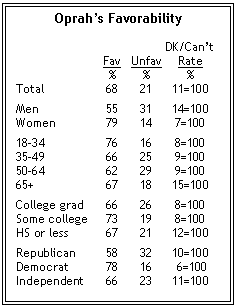
Women continue to have much more favorable opinions of Winfrey than do men. Currently, 79% of women say they have a positive view of Winfrey compared with 55% of men. Both men and women have somewhat less favorable opinions than they did in January 2007 (women 85% favorable, men 63% favorable).
About three-quarters (76%) of Americans ages 18-34 have a positive opinion of Winfrey, which is virtually unchanged from January 2007 (75%). By contrast, views of Winfrey have declined among those older than 35 (74% rated her positively in January 2007, only 64% do so today).
Winfrey’s favorability also has declined among college graduates: two-thirds (66%) now view the talk show host favorably, down from 78% in January 2007. Opinions among people with less education have remained more stable.
Gore’s Better Image
Former vice president Al Gore’s favorability has improved since 2002. Currently, 53% have a favorable opinion of Gore while 36% express an unfavorable view. In December 2002, opinions about Gore were evenly split (44% favorable vs. 46% unfavorable).

Notably, the proportion of Americans saying they have a very favorable opinion of Gore – who won the 2007 Nobel Peace Prize for his environmental activism – has nearly doubled during this period, from 12% to 22%.
A solid majority of college graduates (58%) now view Gore favorably, an 19-point increase since 2002. A quarter of college graduates say they have a very favorable view of Gore – four times the percentage in 2002 (6%). Those with some college education also hold more favorable views today (58% compared with 43% in 2002). Opinions of Gore have not changed among those with a high school education or less; fewer than half in this group view Gore favorably (47%).
More than seven-in-ten Democrats (72%) have a favorable opinion of Gore, who was the party’s presidential nominee in 2000; overall, Democrats’ views of Gore have changed little since 2002 (69%). However, the proportion of Democrats expressing a very favorable opinion of Gore has increased by 11 points (from 24% to 35%). About half of independents (53%) have a favorable impression of Gore, up from 44% six years ago. Republicans’ views of Gore have improved a bit but remain negative; just 29% of Republicans say they have a favorable impression of the former vice president.
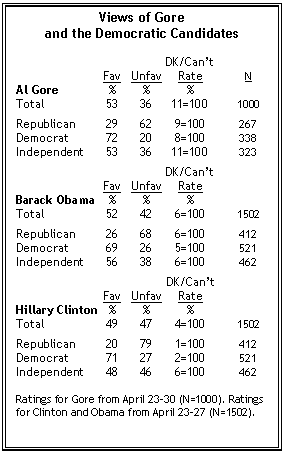
Gore, Obama and Clinton
Gore’s image is somewhat more favorable, on balance, than Barack Obama’s and much more favorable than Hillary Clinton’s.
Democrats have comparably favorable opinions of Gore, Obama and Clinton (72%, 69% and 71%, respectively). But slightly more Democrats have an unfavorable opinion of Obama (26%) and Clinton (27%) than they do of Gore (20%).
Gore’s unfavorable rating among Republicans, while high (62%), is substantially lower than Clinton’s (79%); Obama’s unfavorable rating among Republicans falls in between, at 68%.
Robert Gates Still Not Widely Known
After almost a year and a half on the job, Secretary of Defense Robert Gates remains a largely unrecognized figure. Fully 45% of Americans either do not know enough about Gates, or declined to offer an opinion. Roughly a third (34%) expresses a favorable opinion compared with 21% who have an unfavorable view.
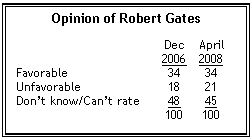
Gates is no better known now than he was in December 2006 – his first month in office – when 48% of the public did not offer an opinion of him.
Yet among those familiar with him, Gates’ image is better than his predecessor’s, Donald Rumsfeld, and on par with Secretary of State Condoleezza Rice’s. More than six-in-ten (62%) of those able to rate Gates express a positive opinion of him. In April 2006, fewer than half (45%) of those familiar enough with Rumsfeld to offer an opinion expressed a favorable view of the former defense secretary.
Like Rice, and unlike Rumsfeld, Gates has substantial appeal among independents and Democrats. Nearly two-thirds of independents familiar with Gates (65%), and more than half of Democrats (54%), express a favorable opinion of him. In March, comparable proportions of independents and Democrats able to rate Rice expressed positive opinions of the secretary of state.
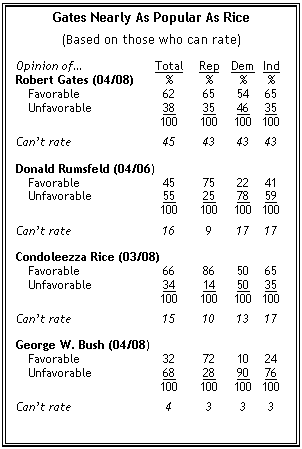
However, both Rice and Rumsfeld get higher ratings from Republicans than does Gates. In March, 86% of Republicans able to rate Rice expressed a favorable opinion of her. In April 2006, Rumsfeld also enjoyed strong favorable ratings among Republicans familiar with him (75% favorable). By contrast, Gates is somewhat less popular within his own party. A majority of Republicans (65%) express a favorable view of him, while about one-in-three (35%) of those who can rate the defense secretary view him unfavorably.
George W. Bush remains widely unpopular among the general public; 68% of those who can rate him offer an unfavorable opinion of the president, compared with 32% who view him favorably. Opinions of Bush are overwhelmingly partisan. A large majority of independents (76%) and an overwhelming 90% of Democrats express an unfavorable view of the president, while 72% of Republicans view Bush favorably, based on those who could offer an opinion of the president.
Bill Gates Remains Popular
Microsoft co-founder Bill Gates continues to be well regarded by a majority of Americans. In March, nearly seven-in-ten (69%) said they had a favorable opinion of Bill Gates, comparable with his rating in May 2000 (64%).
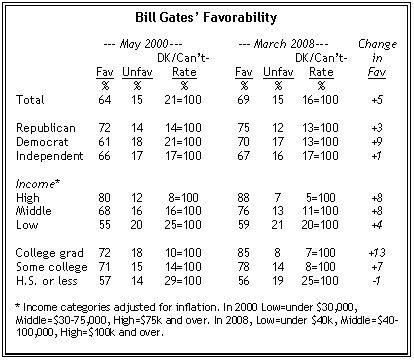
Gates is broadly popular across party lines; large majorities of Republicans, Democrats and independents express a favorable view of him. Democrats, in particular, have become more favorable toward Gates since 2000; 70% of Democrats express a favorable opinion of Gates, up from 61% in 2000. Republicans’ high regard for Gates is little changed from 2000 (72% favorable then, 75% favorable in March).
Nearly nine-in-ten (88%) of those with high annual incomes have a favorable opinion o


